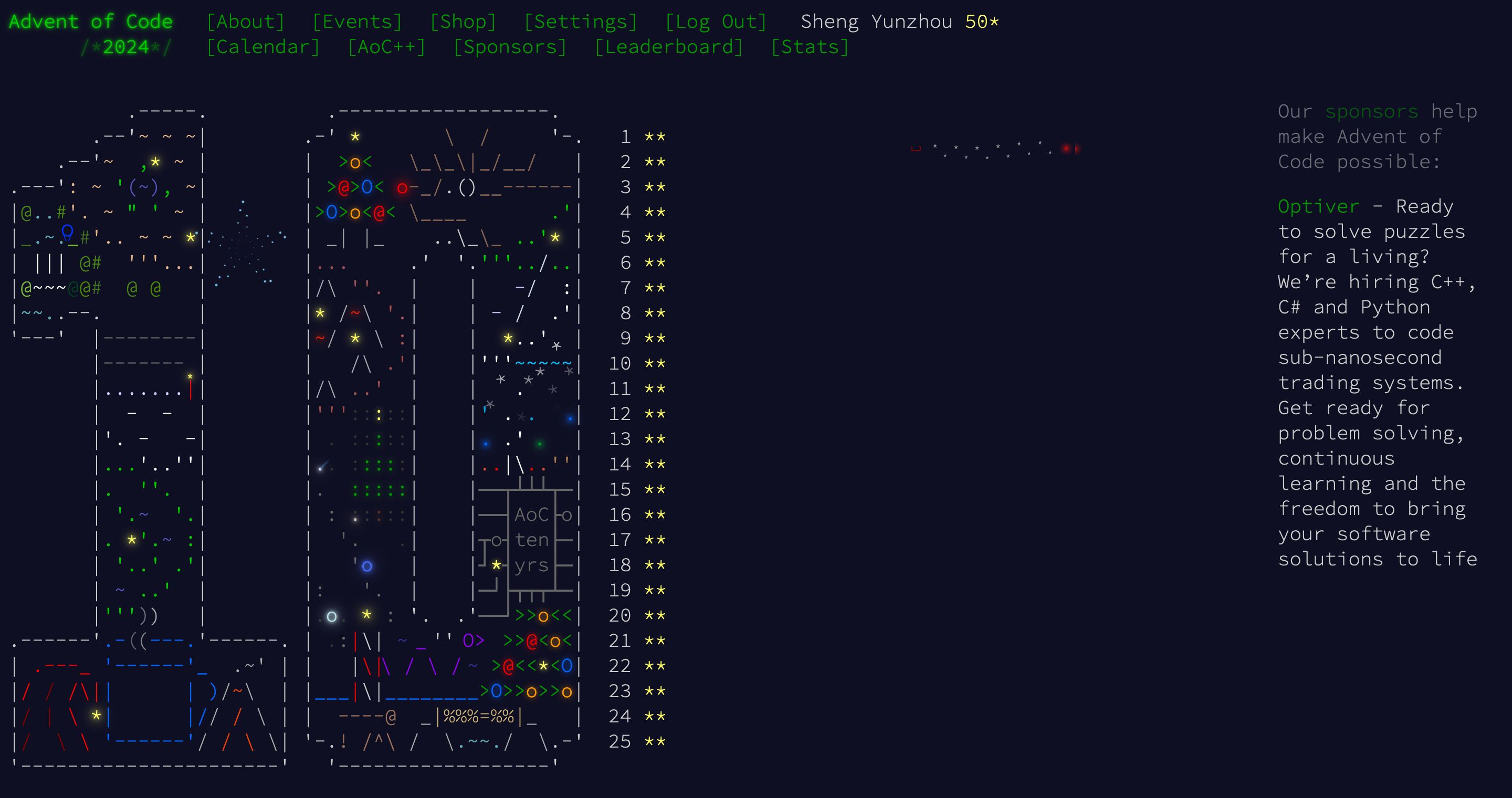Turning the last page of 2024
How time flies! The year 2024 flew by in the blink of an eye! Let's take a brief moment and reflect upon what happened.
Advent of Code 2024
Although I have participated in AOC since 2016, this year is the only year that I managed to complete the entire 50 stars. I think it was only possible because of:
- A company wide leaderboard with many developers (including my line manager) actively participating
- Advent of LLM (e.g. Cursor) which helped a lot along the way (i.e. debugging, generating boilerplate code for problems like Djikstra)
- Active Reddit community to provide hints and reference solutions
I must say that Data Strcuture and Algorithm is not one of my strong suites, as I practically never do that in my daily jobs. When was the last time you implemented a path finding algorithm? However I recognized that these are important and mentally interesting problems to solve. Thank godness we have libraries that handle these for us though.
I also do not feel ashamed to use LLM during AOC, unlike the vehement objections raised by the community in general. Hey I learnt quite a few things following my LLM conversation this year. I have never heard of Bron-Kerbosch algorithm before but now that I know after Cursor informed me! No shame on that, it's all about learning, isn't it? I definitely think my Clojure is getting better after this intensive 25 days period!

Kubernetes + Terraform
Maybe it's blessing in disguise, the Kubernetes platform my company uses isn't entirely well managed and thus exposes a lot of inner workings to developers. As a result, to make good use of it, the complexity of the platform isn't truly hidden. On top of that, there is this custom helm core + values file format we use. As a result, it kind of forces me to truly understand different types of Kubernetes objects and their APIs and how they are wired together. In addition, I was working on setting up a Cloud IDE platform on internal Kubernetes cluster, which was a very good exposure to see what fully featured helm charts look like. In my effort to level up, I found this amazing training siteKodeKloud, which offers various cloud and DevOps trainings. Amazing material and highly recommended.
Data Engineering
It's becoming increasingly clear that in my company, Data Engineering is actually the backbone for most applications. Given it's an asset management firm, most of the applications deal with analytics data. It's all about aggregating data from different sources (manual, 3rd party, etc), apply some logic, then render it to users in different forms (tables, charts, etc). We even have dedicated departments for both generating insights and managing data.
Given this, it has come to my much more obivous attention that I don't have enough experience dealing and I needed to level up quickly. Much of my working experience revolves around general frontend (web, ios, android), and general server side which handles domain logic, instead of ETL with SQL heavy lifting. Yes I did read Designing Data Intensive Applications but my knowledge of SQL is still basic. I can query data and do some joins but I have never designed a database from scratch. Luckily I found DataCamp which offers excellent learning paths for all things data related. Highly recommend it to anyone who wants to level up their data engineering chops.
Reading
This year another accomplishment was that I beat my goal of reading 30 books. I managed to read 32! Out of those, the following books left a deep impression.
Half of a Yellow Sun
Have you heard of the nation Biafra? The vivid struggles of the Igbo people were brought to life in this book. If you want to venture into history of Nigeria and its people, this is a solid recommendation.
Eat to Live
Thanks to this book, I now eat salads way more often that before. It fundamentally changed how I view vegetables, fruits and nuts. I wish I read this book earlier in my life. I'm still not exercising enough but in terms of diet it's definitely better, thanks to Dr. Joel Fuhrman.
Die with Zero
This book along with The Psychology of Money by Morgan Housel made an impact on me in terms of how I view relationship with money. One key take-away is to view my life as distinct seasons. Just like farmrs do different things in different seasons, we should too with regards to money. You don't want to be the one with biggest bank account when you die. I heard a saying the other day, that money is like tickets to the shows we want to watch. What we want is the show, not the tickets, but sometimes we are lost in the differences.
Cheers and thanks for reading!